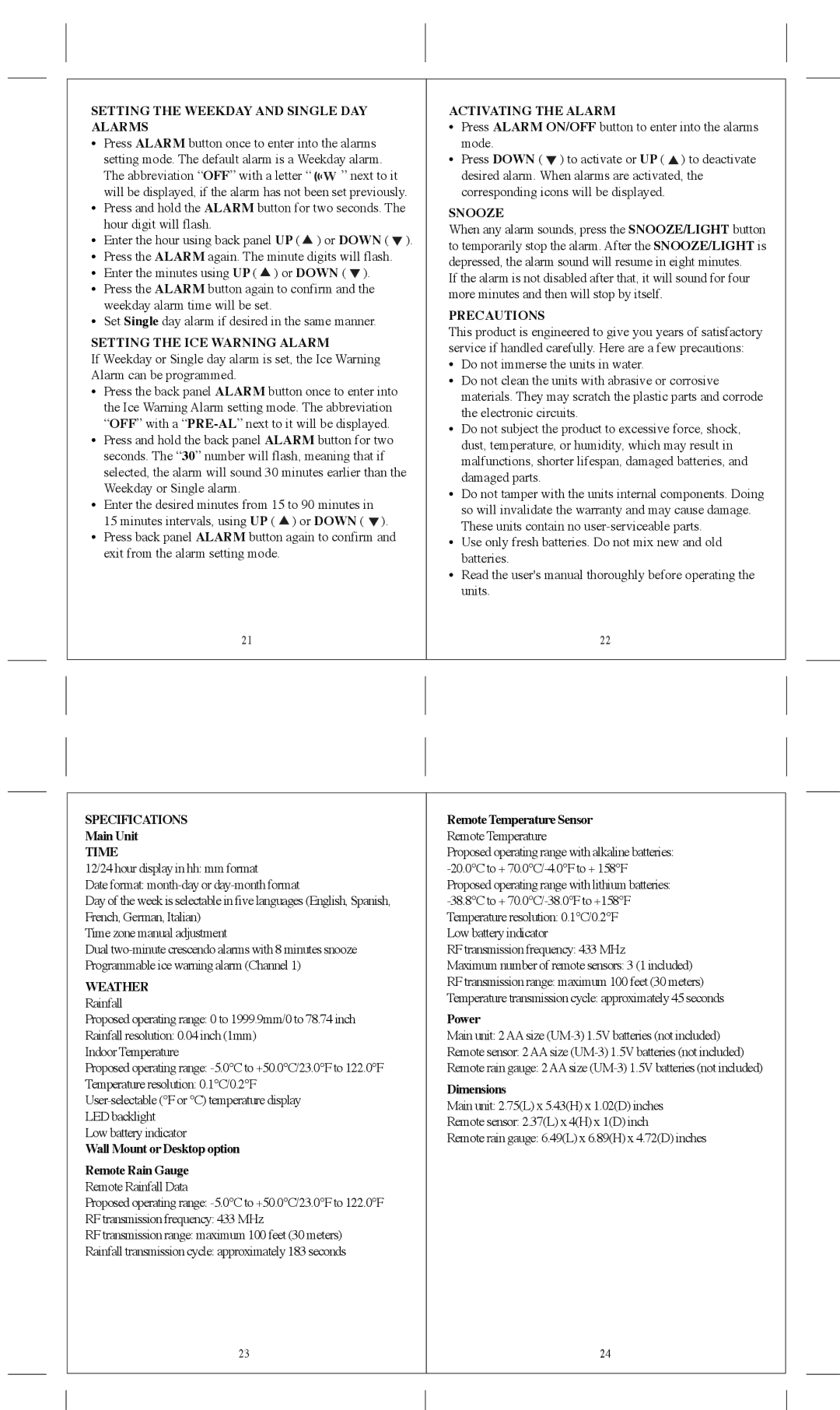
SETTING THE WEEKDAY AND SINGLE DAY ALARMS
•Press ALARM button once to enter into the alarms setting mode. The default alarm is a Weekday alarm. The abbreviation “OFF” with a letter “ ![]()
![]() W ” next to it will be displayed, if the alarm has not been set previously.
W ” next to it will be displayed, if the alarm has not been set previously.
•Press and hold the ALARM button for two seconds. The hour digit will flash.
•Enter the hour using back panel UP ( ![]() ) or DOWN (
) or DOWN ( ![]() ).
).
•Press the ALARM again. The minute digits will flash.
•Enter the minutes using UP ( ![]() ) or DOWN (
) or DOWN ( ![]() ).
).
•Press the ALARM button again to confirm and the weekday alarm time will be set.
•Set Single day alarm if desired in the same manner.
SETTING THE ICE WARNING ALARM
If Weekday or Single day alarm is set, the Ice Warning Alarm can be programmed.
•Press the back panel ALARM button once to enter into the Ice Warning Alarm setting mode. The abbreviation “OFF” with a
•Press and hold the back panel ALARM button for two seconds. The “30” number will flash, meaning that if selected, the alarm will sound 30 minutes earlier than the Weekday or Single alarm.
•Enter the desired minutes from 15 to 90 minutes in
15 minutes intervals, using UP ( ![]() ) or DOWN (
) or DOWN ( ![]() ).
).
•Press back panel ALARM button again to confirm and exit from the alarm setting mode.
21
ACTIVATING THE ALARM
•Press ALARM ON/OFF button to enter into the alarms mode.
•Press DOWN ( ![]() ) to activate or UP (
) to activate or UP ( ![]() ) to deactivate desired alarm. When alarms are activated, the corresponding icons will be displayed.
) to deactivate desired alarm. When alarms are activated, the corresponding icons will be displayed.
SNOOZE
When any alarm sounds, press the SNOOZE/LIGHT button to temporarily stop the alarm. After the SNOOZE/LIGHT is depressed, the alarm sound will resume in eight minutes.
If the alarm is not disabled after that, it will sound for four more minutes and then will stop by itself.
PRECAUTIONS
This product is engineered to give you years of satisfactory service if handled carefully. Here are a few precautions:
•Do not immerse the units in water.
•Do not clean the units with abrasive or corrosive materials. They may scratch the plastic parts and corrode the electronic circuits.
•Do not subject the product to excessive force, shock, dust, temperature, or humidity, which may result in malfunctions, shorter lifespan, damaged batteries, and damaged parts.
•Do not tamper with the units internal components. Doing so will invalidate the warranty and may cause damage. These units contain no
•Use only fresh batteries. Do not mix new and old batteries.
•Read the user's manual thoroughly before operating the units.
22
SPECIFICATIONS | Remote Temperature Sensor | |
Main Unit | Remote Temperature | |
TIME | Proposed operating range with alkaline batteries: | |
12/24 hour display in hh: mm format | ||
Date format: | Proposed operating range with lithium batteries: | |
Day of the week is selectable in five languages (English, Spanish, | ||
French, German, Italian) | Temperature resolution: 0.1°C/0.2°F | |
Time zone manual adjustment | Low battery indicator | |
Dual | RF transmission frequency: 433 MHz | |
Programmable ice warning alarm (Channel 1) | Maximum number of remote sensors: 3 (1 included) | |
WEATHER | RF transmission range: maximum 100 feet (30 meters) | |
Temperature transmission cycle: approximately 45 seconds | ||
Rainfall | ||
Proposed operating range: 0 to 1999.9mm/0 to 78.74 inch | Power | |
Rainfall resolution: 0.04 inch (1mm) | Main unit: 2AAsize | |
Indoor Temperature | Remote sensor: 2AAsize | |
Proposed operating range: | Remote rain gauge: 2AAsize | |
Temperature resolution: 0.1°C/0.2°F | Dimensions | |
Main unit: 2.75(L) x 5.43(H) x 1.02(D) inches | ||
LED backlight | ||
Remote sensor: 2.37(L) x 4(H) x 1(D) inch | ||
Low battery indicator | ||
Remote rain gauge: 6.49(L) x 6.89(H) x 4.72(D) inches | ||
Wall Mount or Desktop option | ||
| ||
Remote Rain Gauge |
| |
Remote Rainfall Data |
| |
Proposed operating range: |
| |
RF transmission frequency: 433 MHz |
| |
RF transmission range: maximum 100 feet (30 meters) |
| |
Rainfall transmission cycle: approximately 183 seconds |
| |
23 | 24 | |
|
|
